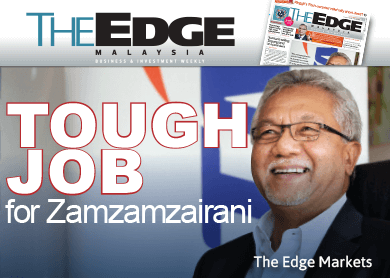
KUALA LUMPUR (July 4): When Telekom Malaysia Bhd (TM) made the decision to buy into loss-making Packet One Networks (M) Sdn Bhd (P1) last year through a partnership framework with Green Packet Bhd (fundamental: 1.10; valuation: 0.30) and South Korea-based SK Telecom Co Ltd (SKT), analysts were unconvinced if the buy-out was a good deal for TM and its investors.
Today, nine months since the acquisition was completed last September with TM controlling 55.3%, Green Packet 31.1% and SKT 13.6%, analysts remain doubtful of the acquisition, with some saying that TM had overvalued the potential of its new wireless business.
But TM managing director and chief executive officer (CEO) Tan Sri Zamzamzairani Mohd Isa, who has been at the helm of the telecommunications giant since April 2008 when TM undertook a demerger exercise that separated the group’s fixed line services from its mobile service operation, is not unused to having to prove doubters wrong, reported The Edge Malaysia (The Edge) in its latest cover story (July 6-July 12), ‘Tough Job for Zamzamzairani’.
Back then, he had had to convince his staff and investors that there was hope of survival and growth for TM without the mobile service operation, which was in an exponential growth phase. He was also tasked with investing in high-speed broadband (HSBB) despite shareholders’ doubts about the returns from such a massive investment.
TM’s RM8.9 billion investment in HSBB has started to bear fruit with UniFi becoming a household brand now, as it continues to dominate the fixed-line telephone services in Malaysia.
To Zamzamzairani, the missing piece of the puzzle to secure the company’s growth into the future is mobile broadband services. Cue P1. He just has to convince the investing public that buying into P1 was the move in the right step that will eventually yield returns.
“If you look at the big picture, we are already the broadband champion in Malaysia. Our customer base has increased to 2.23 million, led by more than 780,000 UniFi subscribers, and counting. So, what is TM’s next step? The key is to become a convergence champion,” he told The Edge.
TM’s initial investment was RM350 million to subscribe for a 57% stake in P1 and RM210 million to pump into Green Packet’s newly issued medium-term notes (MTN), which may be exchanged for Green Packet’s stake in P1 at a later date.
To date, TM has invested close to RM120 million of the RM210 million MTN. The remaining RM90 million is expected to be used this year.
But it has yet to see any contribution from P1. Instead, it is still paying the price of investing in the unprofitable company – in its first quarter ended March 31, 2015 (1QFY15), net profit plunged 38.8% on-year to RM128.9 million, although revenue grew 6% to RM2.77 billion. The weaker earnings was mainly due to the consolidation of P1’s loss of RM49.6 million at Ebit (earnings before interest and tax) level, as well as higher operating costs, such as direct and staff expenses.
Excluding foreign exchange and one-off gains/losses, TM’s normalised net profit of RM171.3 million in 1Q was still below market expectation – only 17.8% of consensus full-year forecast, said The Edge, which also noted that knee jerk reaction to the release of its 1QFY15 results on May 29 saw TM’s shares slid 6.2%.
Zamzamzairani told The Edge that the acquisition must be given time to reap rewards for the company. Similarly, P1 CEO CC Puan also said it’s too early to judge P1, while he shared P1’s plans to roll out LTE networks and services by upgrading is WiMAX networks, and its aspirations to be the first digital mobile operator in Malaysia.
Their calls for patience notwithstanding, the management teams of TM, Green Packet and P1 still cannot say when P1 will become profitable, noted The Edge.
Analysts expect TM’s earnings to continue to be weighed down by P1’s losses in the coming quarters - if not the coming years – and there are concerns that TM won’t be able to pay dividends as promised simply because of the heavy capital expenditure (capex) incurred by the second phase of its HSBB project (HSBB2) and P1.
TM, which is 28.95%-owned by sovereign wealth fund Khazanah Nasional Bhd and 15.07% owned by the country’s largest retirement fund, the Employees Provident Fund, has a policy of distributing annual dividends of RM700 million or up to 90% of normalised profit after tax and minority interests (Patami), whichever is higher. Last year, the total dividend payout was RM846.8 million, or dividend per share (DPS) of 22.9 sen.
Zamzamzairani, however, refuted the concern. “It shouldn’t be a worry. It used to be a worry when we launched the first HSBB, but we have proven that we can execute the plans well. After all, the company’s balance sheet is healthy and we have a clear dividend policy,” he was quoted as saying.
He also shared the progress on the RM1.8 billion HSBB2 to build 1,000 new telecommunication towers and lay undersea cables, and the RM1.6 billion suburban broadband SUBB project that will cover suburban and rural areas by providing 420,000 ports across 750,000 premises within five years, as well as their possible impact on TM.
The Edge Malaysia is available at newsstands and on subscription. Pick up a copy today to find out more. It can also be downloaded from Apple’s Newsstand and Androids’ Google Play.
(Note: The Edge Research’s fundamental score reflects a company’s profitability and balance sheet strength, calculated based on historical numbers. The valuation score determines if a stock is attractively valued or not, also based on historical numbers. A score of 3 suggests strong fundamentals and attractive valuations.)
Save by subscribing to us for your print and/or digital copy.
P/S: The Edge is also available on Apple's AppStore and Androids' Google Play.